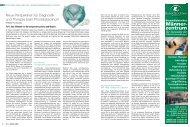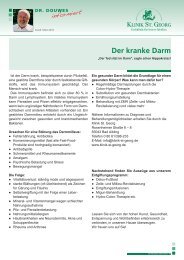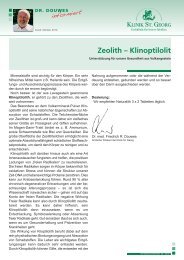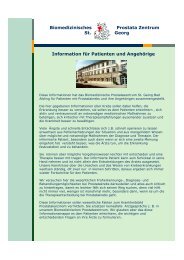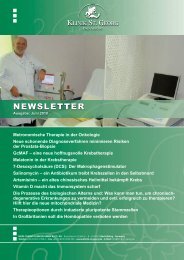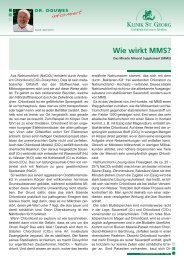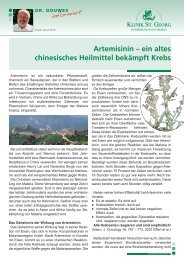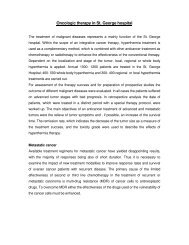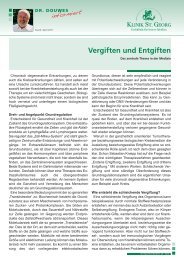InTegraTIve CanCer Therapy ConCepT aT ST ... - Klinik St. Georg
InTegraTIve CanCer Therapy ConCepT aT ST ... - Klinik St. Georg
InTegraTIve CanCer Therapy ConCepT aT ST ... - Klinik St. Georg
Create successful ePaper yourself
Turn your PDF publications into a flip-book with our unique Google optimized e-Paper software.
<strong>InTegr<strong>aT</strong>Ive</strong> <strong>CanCer</strong> <strong>Therapy</strong> <strong>ConCepT</strong><br />
<strong>aT</strong> <strong>ST</strong>. george hoSpITal germany<br />
market lately and have promising clinical effects. One of<br />
these targets is the blockage of tumor angiogenesis (the<br />
growth of blood vessels that feed tumors). Blocking the<br />
formation of vessels is slowing down cancer growth, facilitating<br />
apoptosis - the programmed cancer cell death,<br />
and preventing tumor metastases respectively cancer<br />
spread throughout the body. We could show almost ten<br />
years ago, that hyperthermia has also a marked anti-angiogenetic<br />
effect. The tumor vessels are not as well built<br />
as normal capillaries; they are less organized and cannot<br />
constrict and relax as normal capillaries. In the early<br />
phase of hyperthermia, when the temperature in tumor<br />
tissue is rising, the vessels relax to increase the blood<br />
flow to the tumor tissue, but as soon as the temperature<br />
goes higher then 40°C the constriction of the blood flow<br />
stops, it comes to formation of micro thrombi causing hypoxemia<br />
in the cancer tissue, which together with other<br />
important mechanisms induce apoptosis and cancer cell<br />
death. So hyperthermia is an elegant form of anti-angiogenesis.<br />
Important is also to evaluate some other biomarkers including<br />
a unique set of biochemical tests that include inflammation,<br />
coagulation, and oxidative stress, immune<br />
and hormone profile. These data are important to use<br />
the right phyto chemicals and nutrients. Especially phyto<br />
medicines have multiple potential uses – they are pleiotrophs<br />
– and produce many effects that enable them to<br />
hit more than one target at a time.<br />
• Milk thistle is mostly known for its protective<br />
effects against chemical toxicity,<br />
but it can also prevent the loss of<br />
glutathione, which is fairly common in<br />
cancer patients.<br />
• Ginger has detoxification potential as<br />
well as significant anti-inflammatory effects.<br />
It inhibits both the cyclooxygenase and lipoxygenase<br />
inflamma tory pathways, and is<br />
very effective in reducing nausea and vomiting.<br />
• Lipoic acid may counter neuropathy, a risk for patients<br />
using the chemotherapy drug platinum or paclitaxel,<br />
but also helps to support mitochondria<br />
• Coenzyme Q10 is recommended for patients using<br />
the chemotherapy drugs doxorubicin (Adriamycin ® ,<br />
Doxil*) and trastuzumab (Herceptin ® ), to counteract<br />
the risk of cardiomyopathy.<br />
• Protein and amino acid support formulas have been<br />
helpful in reducing muscle loss, and in maintaining<br />
immune and biological functioning. Other supplements<br />
as used at <strong>St</strong> <strong>Georg</strong>e Hospital to enhance cancer<br />
treatment are: L-Carnitine and Glutamine. When<br />
used in conjunction with chemotherapy, they may reduce<br />
some side effects of treatment, including mouth<br />
sores, neuropathy, and diarrhoea. In addition, glutamine<br />
may increase tumor sensitivity to chemotherapy.<br />
• Fish oil and flaxseed oil may play an important role in<br />
cancer treatment through its ability to help suppress<br />
inflammation. Additionally, omega-3 fatty acids help<br />
reduce the resistance that cancer cells often develop<br />
to cytostatic agents. Some studies have shown that<br />
breast cancer patients who respond favorably to chemotherapy<br />
have higher levels of omega-3s than<br />
those who do not respond.<br />
• Green tea is a potent antioxidant and anti-inflammatory<br />
agent. Green tea consumption has been associated<br />
with a reduced occurrence of early-stage breast<br />
cancer and a diminished risk of lymph node metastases.<br />
EGCG from green tea has anti-metastatic properties<br />
that may block the spread of tumors. <strong>St</strong>udies<br />
suggest that EGCG may work in part by blocking the<br />
activity of matrix met-alloproteinase enzymes. When<br />
over-expressed, these enzymes promote<br />
tumor angiogenesis and metastasis.<br />
Green tea may also help tumors to build<br />
up their own tumor vessels, they have an<br />
anti-angiogenetic effect. To drink at least<br />
three to five cups a day is therefore a<br />
good suggestion.<br />
• Mistletoe extracts improve life quality, the immune<br />
response and prolong the survival time of<br />
cancer patient<br />
• Modified citrus pectin fights cancer by inhibiting primary<br />
tumor growth and suppressing cancer metastases.<br />
Modified citrus pectin is indicated for men with<br />
prostate cancer. Rising levels of PSA have been used<br />
to measure disease progression. Administering modified<br />
citrus pectin to these men increases their PSA<br />
doubling time, indicating a slowing down of disease<br />
progression.<br />
Page 5



